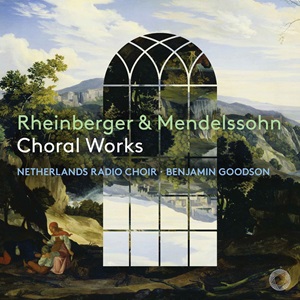
Josef Rheinberger (1839-1901)
Mass in E-flat, Op 109 “Cantus Missae”
Abendlied (from 3 Geistliche Gesänge, Op 69)
Felix Mendelssohn (1809-1847)
Three Psalm Motets, Op 78
Jauchzet dem Herrn, alle Welt (Psalm 100), Op 69 No 2
6 Sprüche, Op 79
Netherlands Radio Choir/Benjamin Goodson
rec. 2022-2023, Muziekcentrum van de Omroep, Hilversum, Netherlands
Pentatone PTC 5187039 [56]
Josef Rheinberger is one of those late 19th century, ultra-Romantic composers whose music is often put in the calorific world of Reger and early Schoenberg, and often avoided by concert promoters who need to sell tickets. That’s a shame, because there’s a lot about the rich textures of his sound world to enjoy. That’s doubly true in this recording of his sacred music, which was new to me, and which comes across very well indeed in these committed performances.
The first thing that strikes you about his E-flat Mass is the unashamed Romanticism of the sound world, which makes Rheinberger’s music sound more sensual and sensuous than we have any right to expect from a piece of liturgical music. The composer isn’t afraid to lay the caramel on thickly, with terrifically warm clusters of chords that make his brand of religiosity sound luscious and as inviting as a warm bath. This isn’t a world of austerity, and there is only rarely any sense of repentance for sins. Instead this is the world of late-Romantic sensuality when every composer had come under the influence of Wagner, and had the tools to reshape choral music – even sacred choral music – in the image of this newly expanded sound world.
At times, Rheinberger sounds like a kid in a sweet shop, as though determined to show what he can do in this new world. There are moments of vigour in the Credo, and some inward-looking reflection at Et incarnatus est. But the predominant tone is one of gentle beauty, as though mankind is satisfied with the position of his faith and is not afraid to enjoy it. That’s so refreshing as to be almost radical when you compare it with the much more anguished statements of faith that tend to characterise most of the best-known choral music of the nineteenth century. And it’s a lovely thing to be able to sit back and revel in this composer’s quiet assurance.
The singers match this with choral tone of gorgeous warmth and sensuous beauty. This is helped by the close positioning of the microphones to bring the sound right up close to the ears in a way that lets the listener revel in the treacly beauty without letting it cloy. Everything is built upon a rock-solid bass line which grounds the tuning and seems to let the lines above it flower. That makes the high-lying beauty of the Sanctus all the more lovely as a contrast, but all the way through the double-choir texture manages to be both enveloping and clear at the same time. Conductor Benjamin Goodson directs the whole thing with a sensible feeling of the music moving constantly forwards, while giving it just enough space so that it can wallow when it needs to. Rheinberger’s much more famous Abendlied is more obviously mobile, but still retains that beauty and warmth in the heart of its textures.
The much more familiar Mendelssohn settings, also (mostly) for double choir, benefit from similar richness of textures and complexity of approach. Here, however, the multitextured choral sound is more openly pictorial, with busy “raging” for the opening of Psalm 2, replaced by calmly meditative soloistic textures as the text sets its sights on God. More rigorous choral strictures accompany the justificatory text of Psalm 43, and there is an affecting sense of loneliness in the call-and-response textures of Psalm 22, which becomes more dramatic as it progresses.
The six “Sayings” Op 79 all relate to different times of the church year. They are brief, punchy, and very convincingly delivered here. Because they’re almost all less than two minutes long, they make their impact with straightforward directness. That is very winning, from the quiet jubilation of Advent to the unrestrained joy of the famous Frohlocket for Christmas, or the gentle thoughtfulness of New Year, Lent and Good Friday. These are jewels, all of them gorgeously sung and thoughtfully directed, with a sense of their spiritual message as well as their musical power.
Separately, Mendelssohn’s beautifully direct setting of Psalm 100 is a delight, perhaps the most straightforwardly communicative thing on the whole disc.
The whole thing is extremely well executed, clearly a labour of love for Benjamin Goodson, and all the more so because this is his debut recording with the choir of which he has recently become Chief Conductor. Full texts and translations are provided, together with helpful essays by the expert Katy Hamilton, and Pentatone’s recorded sound is gorgeous throughout. Heady sensuality combined with religious rigour: what’s not to like?
Simon Thompson
Previously reviewed by John Quinn (June 2024)
Buying this recording via a link below generates revenue for MWI and helps us keep free access to the site




















